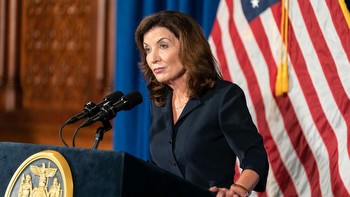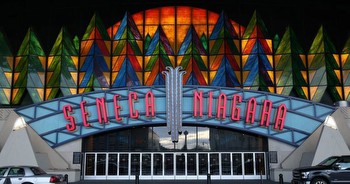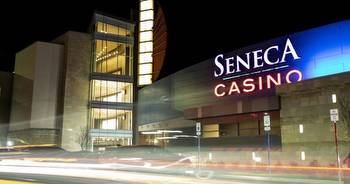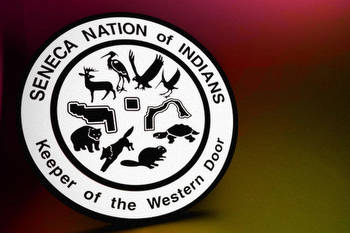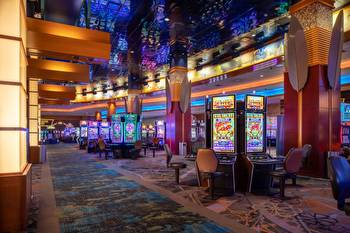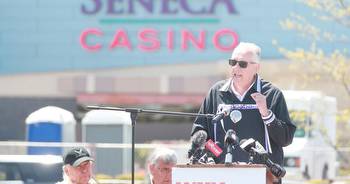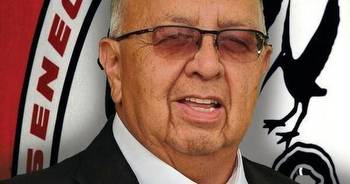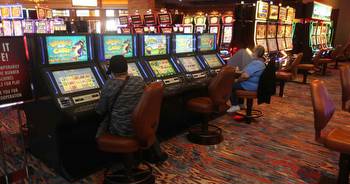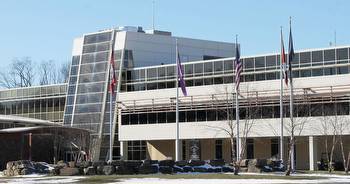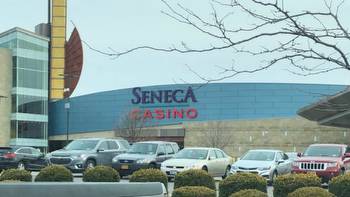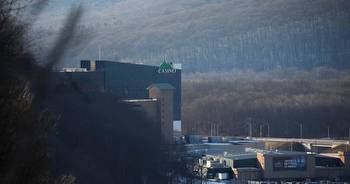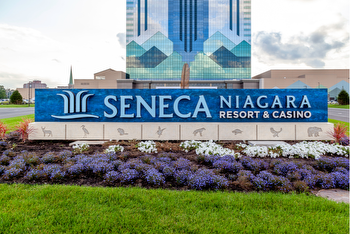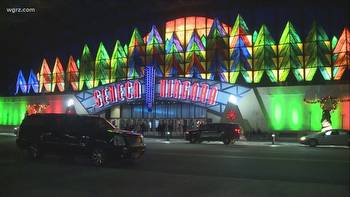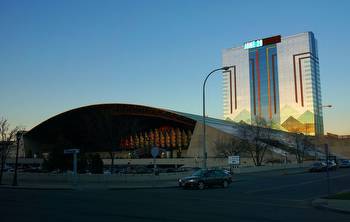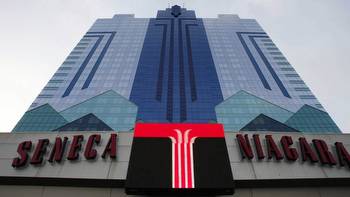Exclusive details in deal to put Seneca casino in Rochester
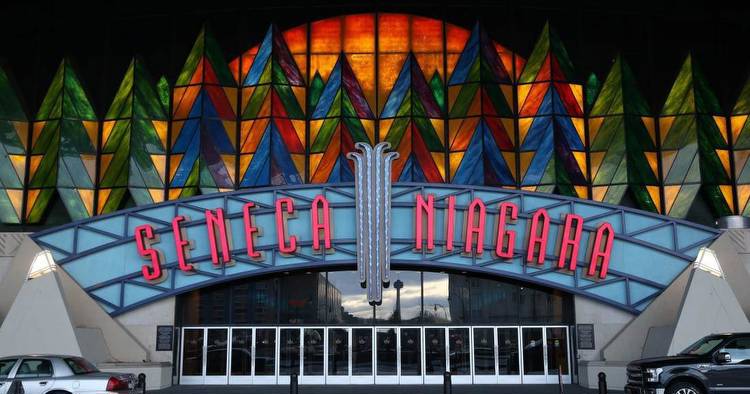
ALBANY – On Friday evening in Albany, an explosive rumor began circulating about a secretive gaming compact struck between the Seneca Nation and Gov. Kathy Hochul’s administration.
Two days earlier, the Nation and Hochul’s office had struck a deal on the broad outlines of a new, 20-year agreement.
The details of the deal were kept secret. Yet the legislative session in Albany was also ending – and the Legislature was facing pressure to pass an eleventh-hour bill preauthorizing the Hochul administration to finalize the agreement, despite the details being unknown.
On Friday, the State Senate had passed the authorizing bill by a 62-1 vote. But around 7 p.m., the powerful state Hotel and Gaming Trades Council heard that the agreement would allow a new, Seneca-owned casino to be built in downtown Rochester. Word quickly spread to the Rochester delegation in the Assembly, which had not been informed of the plan. Neither had Rochester local elected officials.
In tense conversations into the night, Rochester elected officials, as well as the hotel and gaming union – which represents nearly 1,000 workers at the del Lago casino Resort and Casino about 47 miles east of downtown Rochester – sought to confirm the rumor with the Hochul administration.
In the waning hours of the 2023 state legislative session, Albany lawmakers are passing bills upending local elections, rolling back a campaign finance reform, sealing criminal convictions and much more. Here's the latest.
They were stunned by the answer. The Hochul administration had signed a “non-disclosure agreement” with the Seneca Nation and could not share the details.
But top Hochul officials also did not deny that a Rochester casino was part of the deal, and on Saturday, the Assembly refused to pass the bill authorizing Hochul to enter a new compact, throwing the deal negotiated by Hochul’s office into serious question.
Deal’s details
On Monday, The Buffalo News confirmed several of the major aspects of the agreement struck between the Hochul administration and Seneca Nation.
The deal does authorize a Seneca-owned casino to be built in the Rochester market, according to people with knowledge of the matter.
During the first year of the pact, the Nation would pay 9.75% of revenue on slot machines and other gaming devices to New York State, according to people with knowledge of the matter. During the 19 subsequent years, the Nation would pay 19.5%, according to two sources.
The deal also includes terms related to the prospect of New York legalizing online casino games, or iGaming. The exact details of the arrangement were not clear on Monday.
The Seneca Nation declined to comment on the terms.
If a casino were built in Rochester, a significant slice of the state payment made by the Senecas would likely be shared with Rochester. That is one potential lure for the city, where so far, local officials have expressed opposition.
Under the original compact struck between the Nation and state in 2002, the Nation has in recent years been paying 25% of revenues on slot machines and other gaming devices in exchange for the exclusive right to offer these devices west of State Route 14.
The Nation has opened three casinos, but under the new compact, would be allowed the fourth in Monroe County.
The way that the Hochul administration pursued the Seneca agreement was different from its ongoing process for awarding three, new downstate casino licenses.
In that instance, applicants must gain substantial support from local elected officials and communities where a casino might be sited, and go through a rigorous, competitive bid process. In the Seneca negotiation, the Hochul administration sought to gain the Legislature’s approval to strike a deal without notifying Rochester officials of the casino proposed for the area.
That was because of the non-disclosure agreement, which according to a person with knowledge of the matter, was the result of the icy relationship between the Seneca Nation and Hochul administration, and meant to ensure details of the negotiations were not leaked. But it also meant that on Friday, Hochul officials felt unable to inform Rochester lawmakers of the new planned casino.
The deal has generated alarm from members of the Rochester delegation in the Legislature, as first reported on Saturday by Politico. Also, the deal has spurred outrage from the Hotel and Gaming Trades Council.
Since their creation a decade ago, the four upstate casinos in New York have performed worse financially than expected, and a chunk of del Lago’s customer base comes from the Rochester area.
“Another casino in the Rochester area would almost certainly devastate existing operations and cost almost 1,000 union workers the irreplaceable good jobs they rely on,” said Rich Maroko, president of the Hotel & Gaming Trades Council. “That’s simply too high a price to pay for those workers and their families, who count on their wages and benefits for basic necessities like housing and healthcare.”
Del Lago, in Waterloo, is also at a competitive disadvantage in terms of tax payment. Last year, the casino paid the state 30% on slots and 10% on table games – substantially more than the Seneca Nation would pay under the new deal.
“I certainly have grave concerns about a casino in any part of the City of Rochester,“ said Rochester Democratic Assemblyman Harry Bronson, “In addition, I’m also concerned about a casino being sustainable simply because we’re pretty close to reaching saturation. Legislators who represent the area at the state level, as well as at the local level should have been consulted directly.”
Leadership at Batavia Downs believes the wording in a bill sponsored by Democratic State Sen. Tim Kennedy would effectively lead to the shuttering of three racinos in the state.
As for the Nation, it must not only deal with Albany politics, but its own internal politics. The terms of deal struck with New York will have to be approved in a referendum of the Nation’s citizens.
When the Nation entered its initial compact in 2002, there were relatively few gaming options in the northeast United States. Now, the region is saturated. And within the Nation, some believe the diminished value of its exclusivity agreement with New York should mean the Nation pays none of its gaming revenue to the state.
If the Nation were not allowed the fourth casino in Rochester, its leadership would likely be unwilling to pay a roughly 20% revenue share to the state, as currently negotiated. Instead, it would likely seek a much lower rate.
A well-timed vote
Late Thursday, State Sen. Tim Kennedy of Buffalo introduced the Senate bill authorizing Hochul to enter the casino compact.
During remarks on the Senate floor on Friday, Kennedy, framed it as enshrining “strong labor protections for unions to organize” in Nation facilities, while ensuring the Nation would maintain an “adequate civil recovery system that guarantees fundamental due process to visitors and guests.”
The lone vote against Kennedy’s bill was Democratic State Sen. Jeremy Cooney – who happens to represent Rochester.
On Monday, Cooney explained that he’d recently seen an article in the Rochester Business Journal stating that the Seneca Nation was interested in a casino in the Rochester area.
“I did not feel comfortable voting for a piece of legislation that really didn’t have a lot of details behind it,” Cooney said. “So my general attitude was well, let’s see. Let’s see the agreement and then make a decision to support it through a vote or not. Because there could be an implication for Rochester, maybe, maybe not, but we’re not getting any information from our partners in state government about what the details were.”
Earlier this year, the Seneca Nation approached State Sen. Tim Kennedy with an idea for legislation benefiting the Nation during high-stakes gaming compact negotiations. But since the bill's introduction, a disconnect has emerged between the Nation and Kennedy, its most valuable ally in the State Legislature.
The Rochester City Council sent a letter to Hochul on Monday asking her to “halt any conversation about a downtown Rochester casino.” And Rochester Mayor Malik Evans released a statement on Monday stating that that “there are already numerous casinos in the Rochester area. My focus remains on meaningful opportunities that create a vibrant Rochester economy focused on the jobs of the 21st century.”
The deal negotiated by Hochul’s top aides and the Seneca Nation is now in peril. (Hochul has recused herself from the negotiations because of a potential conflict of interest.)
The Senate ended its work for the 2023 legislative session early Saturday morning. The Assembly adjourned Saturday afternoon without passing the bill authorizing a new compact, but may well return in the coming weeks.
Amid the opposition from Rochester, the Hochul administration may now have to redo its deal with the Seneca Nation, this time with the Legislature involved.
If the news of the Rochester casino had not leaked Friday night, the entire dynamic might be different.
“I’m glad someone leaked it,” Bronson said, “because otherwise, it would be just left to us to push back locally against a potential casino.”








